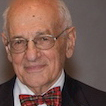
Hundreds of protestors rally against Donald Trump outside Trump Tower in New York City on Nov. 9, 2016. (Photo by Drew Angerer/Getty Images)
If I were asked to say what I’m feeling right now, I’d start by saying that I opened my eyes yesterday morning and lay in bed for a good while, hoping I had simply experienced a nightmare, and that I was unwilling to get up, collect The New York Times from the door and learn it was true. Donald Trump — a man without the slightest evidence of any talent or even interest in governing a democratic nation, had been elected president of the United States. The America that friends of liberty and justice had known was on the skids to some kind of authoritarian regime at the hands of a hate-mongering, lying bully. I didn’t want to live to see that horror.
But weeping and wailing and gnashing of teeth can only last so long. We don’t know at the moment exactly what Trump will do. He probably doesn’t know himself. He has said so many contradictory things on so many occasions that there is simply no telling. We can take heart that our defeat was peaceful — no armed mobs of Trump followers stormed into polling places seizing and destroying ballot boxes. We may only be in the eye of the hurricane, but in that zone of calm, we have been given time to prepare. Thinking about how to use it intelligently should be a priority. I’m mindful of how, in a crueler hour than this — the Civil War — Lincoln’s second annual message to Congress was, “We must think and act anew.” There was no precedent for what had happened to guide us.
I am pretty sure in my mind about what we should not do. No finger-pointing, analyzing or recriminations in a search for scapegoats should be allowed. Infighting is the eternal curse of democratic reform movements, precisely because welcoming instead of crushing dissent is their admirable hallmark. At some point there has to be reasonable compromise and a leadership given practical authority. We can at least hope that’s possible. Nor do we need long conferences and talk-fests to chart a future agenda. We need to facilitate quick reaction to events as they occur in real time. What kinds? Hard to tell when we don’t have many clues about what they’ll be. Let plenty of ideas bloom, but keep in mind Joe Hill’s dying message: “Don’t waste time mourning. Organize.” Maybe even some kinds of coalition among Sanders Democrats, third parties (remember that the Greens flirted with offering Bernie a spot on their ticket) and a very few Republicans with some sense of decency left is possible. Whatever specifics we experiment with, the job is to woo back the lost sheep — the working families who were once the base of the Democratic Party.
The materials are there. There are still primarily youthful leaders of pressure groups like Fight for $15, Black Lives Matter, Occupy Wall Street and others, who will bounce back from the immediate shock and be ready to push from below. They could be the driving force behind an experienced and flexible leader who can both create and use a public opinion that gave its blessing to reform. I grew up in the best years of a president like that, and Bill Moyers worked for another. FDR and LBJ had far different personalities and backgrounds, but they shared a common talent for lighting fires and using government as a tool for making “impossible” things possible. And if it’s impossible to find a single figure like that, can we create a united movement to reclaim our country without one? Or at least a movement ruled by a chosen group leadership united in purpose, sensitive to its followers and able to present a united front of resistance to power?
I am not playing Pollyanna or lifting my own spirits with a pep talk. But I don’t want to watch the approaching darkness in passivity. Lord knows I don’t recognize the United States of yesterday morning as anything like the country that I grew up in, in whose army I served, whose history I proudly taught. Likewise, what keeps me from banging my head against the wall is simple gratitude to have lived a privileged life in the good times of the ’50s and parts of the ’60s. I don’t miss them in the way many Trump voters do. They recall them as times of American supremacy, when Uncle Sam bestrode the world, as a friend of mine once said, with mistletoe tied to his coat tails. But I do recall them as far kinder and gentler to the least powerful of us than the last 40 years have been (and yes, I don’t shirk the social barriers facing African-Americans, gays and women that existed then but that we have partly overcome.) So, given this personal luck, plus the gifts of a loving family and the comforts of the arts and the special luck of good health, I think it would be a waste of time and a shame for me to sulk and grumble the rest of my life away.
Is that Pollyanna speaking? No — we may be past the point of no return. But remember Pandora’s box: When she opened it, she let all the troubles of humankind loose upon us — but the last thing to emerge was hope, which keeps us alive. To hope is vital, but to hope with action is what will save us, if anything does.




